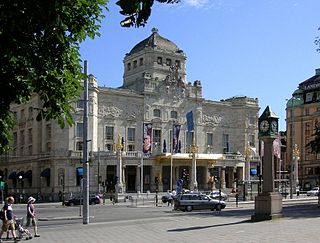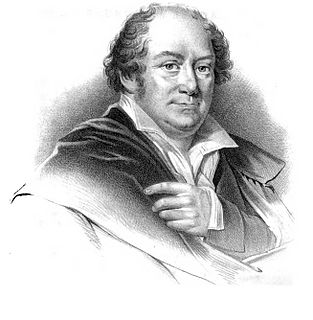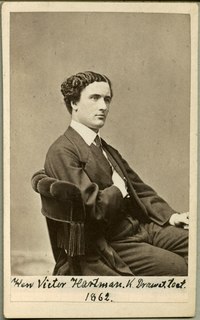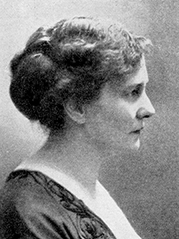
The Royal Dramatic Theatre is Sweden's national stage for "spoken drama", founded in 1788. Around one thousand shows are put on annually on the theatre's eight running stages.

Jacob Niclas Ahlström was a Swedish Kapellmeister and composer.

Ebba Charlotta Elise Hwasser née Jakobsson was a Swedish stage actress. She was an elite actor and has been referred to as the leading lady of the Royal Dramatic Theatre in the mid 19th-century.

Inga Åberg was a Swedish actress and opera singer. She was engaged as an opera singer at the Royal Swedish Opera, and as a stage actress at the Royal Dramatic Theater, between 1787 and 1810.

Lars Hjortsberg was a Swedish stage actor. He belonged to the pioneer generation of elite actors of the Royal Dramatic Theatre and has, alongside Emilie Högquist, been referred to as the most famous Swedish actor of the first half of the 19th-century.

Karolina Sofia Bock née Richter was a Swedish stage actress. She was the principal and drama teacher of the Royal Dramatic Training Academy twice: from 1831 to 1834, and from 1841 to 1856. She was an elite actress of the Royal Dramatic Theatre.
Gertrud Elisabeth Forsselius née Forsell, also called Forselia, later known as Elisabet Haeffner and Elisabet Fahlgren, was a Swedish stage actress and opera singer. She belonged to the pioneer generation of the Royal Dramatic Theatre.

Louis Joseph Marie Deland was a Swedish ballet dancer, singer, actor, choreographer and ballet master in the Royal Swedish Ballet. He is often considered the first native male star in the Royal Swedish Ballet.

Johanna "Jeanette" Charlotta Granberg, also known by her married name Stjernström and by the pseudonym of Georges Malméen, was a Swedish writer, a playwright, a feminist and a translator, who wrote plays for mainly the theatre Mindre teatern in Stockholm in the mid-19th century. She was praised as a great dramatic by her contemporaries.
Erik Wilhelm Djurström was a Swedish stage actor. He was the director of the travelling Djurström theater company, which was one of the best known in the first half of the nineteenth century.

Nils Vilhelm Almlöf (1799–1875) was a Swedish stage actor. He was one of the most famous Swedish actors of his time and referred to as "The Swedish Talma".

Edvard Maurits Swartz, was a Swedish stage actor. He was one of the star actors of the Royal Dramatic Theatre in the mid 19th century.

Euphrosyne (Euphrosina) Löf was a Swedish ballet dancer and stage actress, best known for her affair with Prince Frederick Adolf of Sweden from 1795 to 1800, after his relationship with Sophie Hagman. Euphrosyne Löf acted as his hostess at Tullgarn.
Maria Sofia Angela "Angelique" Magito (1809–1895) was a Swedish opera singer, concert singer, and stage actress. She was one of the best-known artists of the travelling countryside theatres in Sweden and was called the "opera singer of the countryside".

Gustaf Fredrik Åbergsson née Åberg was a Swedish stage actor, theatre director and principal of Dramatens elevskola. He is one of the leading actors in Swedish theatre history.
"Ebba" Jeanette Morman was a Swedish stage actress. She was active at the Royal Dramatic Theatre in 1791-1802 and was popular actress, known for her demonic character portraits.

Victor Laurentius Hartman was a Swedish actor.

Hedvig Lovisa Charlotta Deland, was a Swedish stage actress.

Per Sällström (1802-1839) was a Swedish opera singer (tenor). He was an elite member of the Royal Swedish Opera from 1820 to 1839.

Sigrid Agneta Sofia Elmblad, born Sigrid Agneta Sofia Pettersson, was a Swedish journalist, poet, translator and writer, who translated Der Ring des Nibelungen into Swedish and produced the first Swedish translation of the song of Saint Lucy. she produced her first poems under the pseudonym Toivo. Born in Stockholm to a Swedish father and Finnish mother, she was an early member of the Nya Idun society, rising to be chair between 1918 and 1921. After working as a journalist for the newspaper Dagens Nyheter, she travelled extensively with her husband, the opera singer Johannes Elmblad. While living in Bayreuth, she developed her interest in the music of Richard Wagner, which led her to translate his works into Swedish, including Parsifal in 1917, and the work of other German composers like Robert Schumann. She also wrote fiction for adults and children, as well as biographies for figures like Jenny Lind in 1920. She died in Sweden six years later.
















